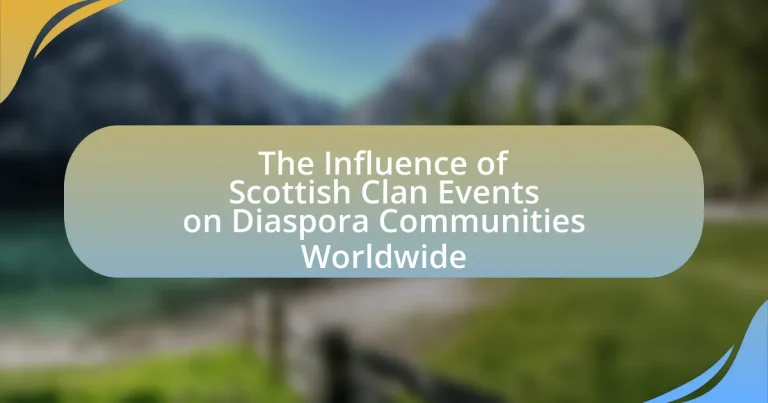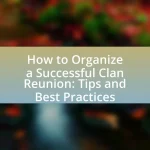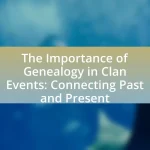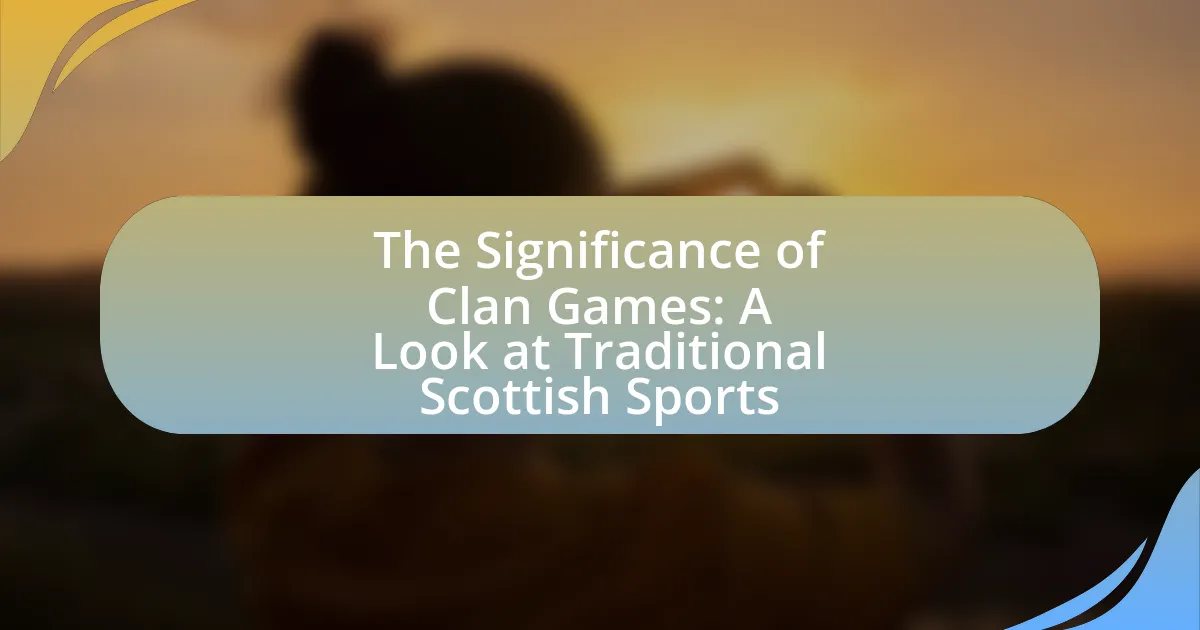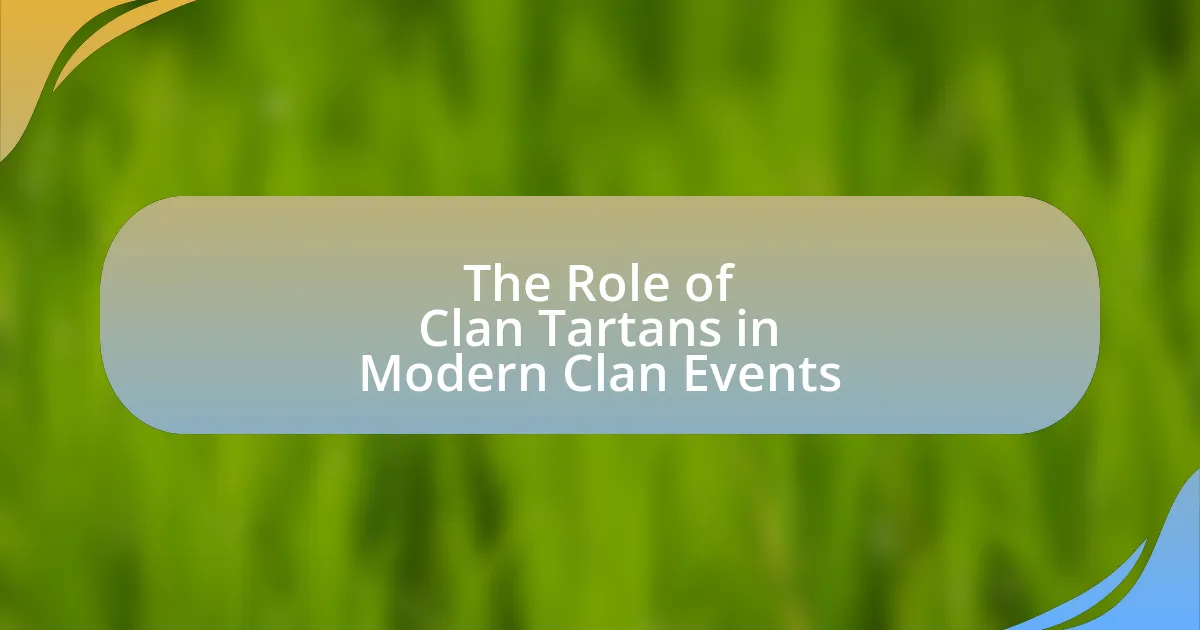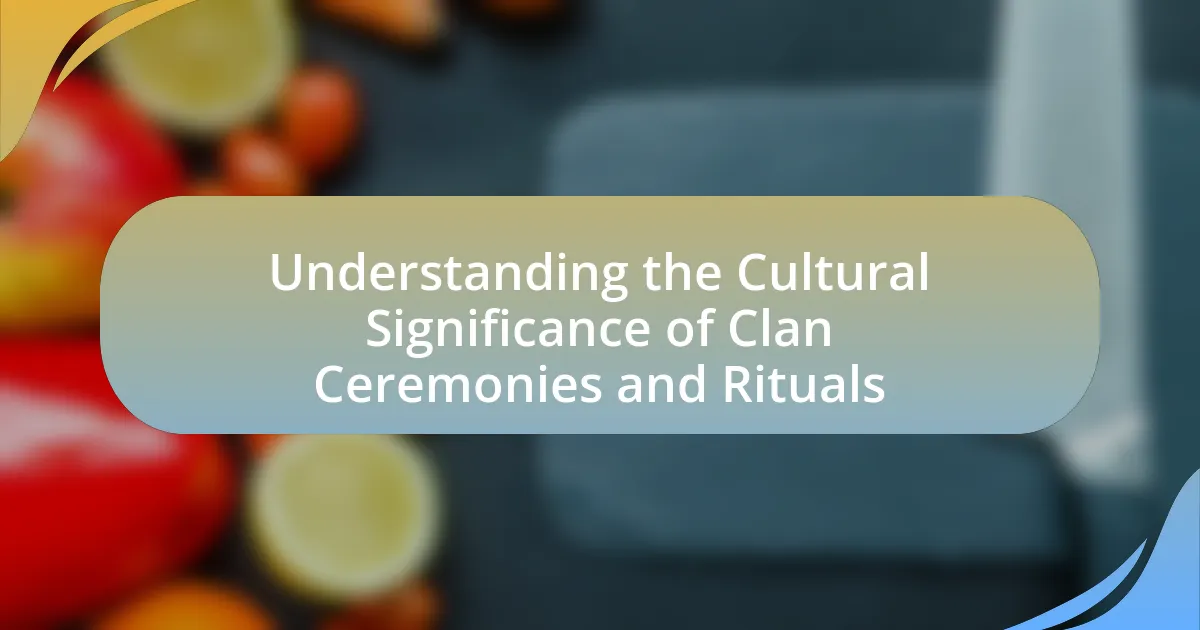Scottish Clan Events are significant gatherings that celebrate the heritage, culture, and history of Scottish clans, playing a vital role in reinforcing clan identity and solidarity among diaspora communities. Originating from medieval clan gatherings, these events have evolved into global celebrations that include Highland Games, clan reunions, and cultural festivals, fostering connections to ancestral roots. The article explores the historical significance of these events, their impact on community cohesion, and the challenges faced by diaspora communities in organizing them, while also highlighting future trends influenced by technology and the engagement of younger generations.
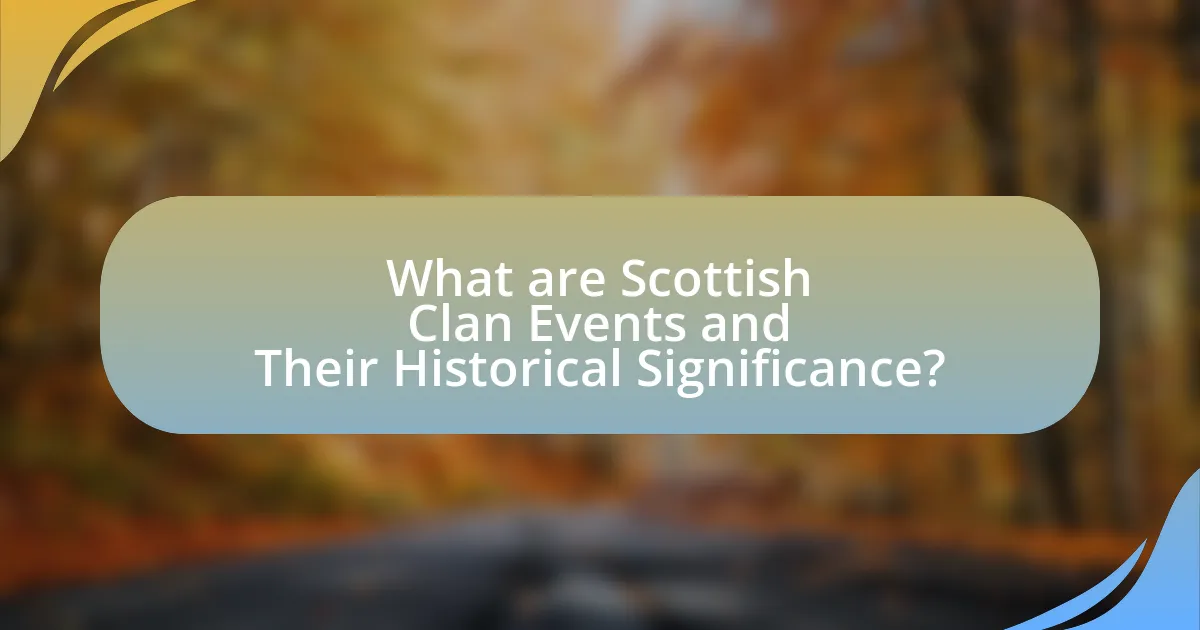
What are Scottish Clan Events and Their Historical Significance?
Scottish Clan Events are gatherings that celebrate the heritage, culture, and history of Scottish clans, often featuring traditional music, dance, and competitions. These events hold historical significance as they serve to reinforce clan identity and solidarity, particularly among descendants of Scottish emigrants who maintain connections to their ancestral roots. Historically, clan gatherings date back to the medieval period when clans were essential social structures in Scotland, providing a sense of community and belonging. The events also play a crucial role in preserving Scottish traditions and fostering a sense of pride among diaspora communities, as evidenced by the numerous clan societies established worldwide that organize these events to celebrate their lineage and cultural heritage.
How did Scottish Clan Events originate?
Scottish Clan Events originated from the historical gatherings of clans in Scotland, primarily for social, political, and military purposes. These events were established during the Middle Ages when clans served as the primary social units, providing a sense of identity and community among members. The first recorded clan gatherings date back to the 12th century, where clans would convene to celebrate their heritage, resolve disputes, and strengthen alliances. The significance of these events grew over time, particularly during the 19th century, when the romanticism of Scottish culture led to organized clan gatherings, such as the Highland Games, which celebrated traditional sports and cultural practices.
What role did clans play in Scottish society?
Clans played a central role in Scottish society by serving as social, political, and economic units that fostered loyalty and identity among their members. Historically, clans were organized around a chief, who provided protection and leadership, while clan members supported each other in various aspects of life, including warfare, agriculture, and trade. The clan system facilitated a sense of belonging and community, which was crucial in a landscape marked by feudalism and territorial disputes. Additionally, clans contributed to the preservation of Scottish culture and traditions, as they often organized events and gatherings that reinforced their heritage and collective identity.
How have clan events evolved over time?
Clan events have evolved from localized gatherings focused on kinship and traditional practices to global celebrations that emphasize cultural heritage and community among diaspora populations. Historically, clan events served as a means for clans to reinforce social bonds, share resources, and maintain cultural identity, particularly in Scotland. Over time, especially following significant emigration waves in the 18th and 19th centuries, these events transformed into larger-scale festivals and gatherings that attract participants from around the world, such as Highland Games and clan reunions. This evolution reflects a shift towards inclusivity and the celebration of Scottish identity, as evidenced by the increasing participation of individuals with Scottish ancestry in countries like the United States, Canada, and Australia, where such events often incorporate local customs alongside traditional Scottish elements.
What types of events are associated with Scottish clans?
Scottish clans are associated with various events, including clan gatherings, Highland games, and cultural festivals. Clan gatherings serve as reunions for members to connect, celebrate heritage, and strengthen community ties. Highland games feature traditional athletic competitions, music, and dance, showcasing Scottish culture and fostering clan pride. Cultural festivals often highlight Scottish history, arts, and traditions, engaging both clan members and the wider community. These events play a significant role in maintaining cultural identity among diaspora communities, as they provide opportunities for connection and celebration of shared heritage.
What are the most common clan gatherings and festivals?
The most common clan gatherings and festivals include Highland Games, Clan Gatherings, and Tartan Day celebrations. Highland Games feature traditional Scottish athletic competitions, music, and dance, attracting participants and spectators from various backgrounds. Clan Gatherings serve as reunions for members of specific clans, often involving cultural activities, historical discussions, and social events. Tartan Day, celebrated primarily in North America, honors Scottish heritage and includes parades, music, and cultural exhibitions. These events reinforce clan identity and foster community among diaspora populations, as evidenced by the significant attendance and participation rates reported in various regions, such as the United States and Canada, where Scottish heritage is prominently celebrated.
How do clan events promote cultural heritage?
Clan events promote cultural heritage by serving as gatherings that celebrate and preserve the traditions, customs, and history of specific clans. These events often include activities such as traditional music, dance, storytelling, and historical reenactments, which reinforce a sense of identity and belonging among participants. For example, the annual Clan Gathering in Scotland attracts thousands of attendees who engage in competitions, parades, and cultural exhibitions, thereby fostering a connection to their ancestral roots. This active participation helps to transmit cultural knowledge and practices to younger generations, ensuring the continuity of heritage within diaspora communities.
Why are Scottish Clan Events important for diaspora communities?
Scottish Clan Events are important for diaspora communities because they serve as a vital link to cultural heritage and identity. These events provide opportunities for individuals of Scottish descent to connect with their ancestral roots, fostering a sense of belonging and community. For instance, gatherings such as clan reunions and festivals often feature traditional music, dance, and storytelling, which help preserve and promote Scottish culture among participants. Additionally, research indicates that participation in cultural events can enhance social cohesion and emotional well-being within diaspora groups, reinforcing their connection to Scotland and each other.
How do these events foster a sense of identity among diaspora members?
Scottish clan events foster a sense of identity among diaspora members by providing a platform for cultural expression and community bonding. These gatherings allow individuals to reconnect with their heritage through traditional music, dance, and storytelling, reinforcing shared values and history. For instance, events like the Highland Games and clan gatherings often feature competitions and displays that celebrate Scottish customs, which help participants feel a sense of belonging to a larger cultural narrative. Additionally, research indicates that participation in such events can enhance social networks among diaspora members, creating a supportive environment that strengthens their collective identity.
What emotional connections do diaspora communities have with these events?
Diaspora communities often experience deep emotional connections to Scottish clan events, as these gatherings serve as a vital link to their heritage and identity. The events evoke feelings of nostalgia, pride, and belonging, allowing individuals to reconnect with their ancestral roots and cultural traditions. For instance, participation in clan gatherings can foster a sense of unity among members, reinforcing familial bonds and shared histories. Additionally, these events often include traditional music, dance, and storytelling, which resonate emotionally and help preserve cultural narratives. The emotional significance is further evidenced by the high attendance rates at events like the Scottish Highland Games, where diaspora members actively engage in celebrating their lineage, thus solidifying their connection to Scotland despite geographical distances.
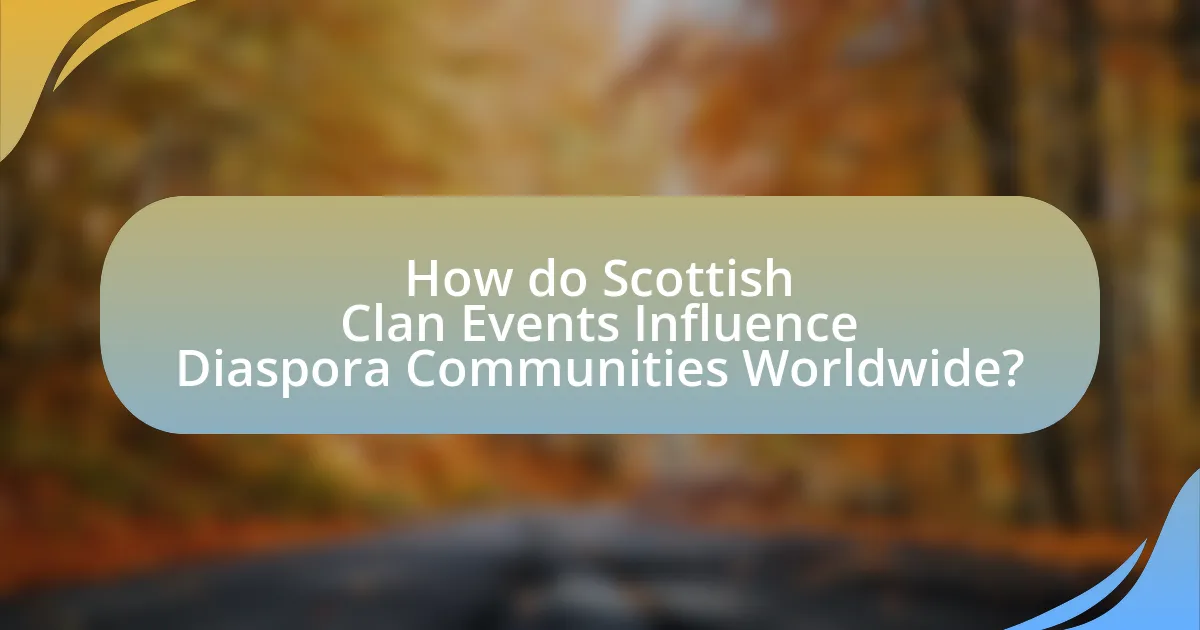
How do Scottish Clan Events Influence Diaspora Communities Worldwide?
Scottish clan events significantly influence diaspora communities worldwide by fostering cultural identity and community cohesion among individuals of Scottish descent. These events, such as clan gatherings and Highland games, serve as platforms for diaspora members to connect with their heritage, share traditions, and strengthen familial ties. For instance, the Grandfather Mountain Highland Games in North Carolina attracts thousands of participants and spectators, reinforcing a sense of belonging and pride in Scottish ancestry. Additionally, studies indicate that participation in such events enhances social networks and promotes cultural exchange, thereby sustaining Scottish traditions across generations.
What impact do clan events have on community cohesion?
Clan events significantly enhance community cohesion by fostering a sense of belonging and shared identity among participants. These gatherings provide opportunities for individuals to connect with their heritage, engage in cultural practices, and strengthen social ties. Research indicates that participation in clan events can lead to increased social capital, as individuals form networks that support mutual aid and collaboration. For instance, a study by the University of Edinburgh found that clan gatherings contribute to a 30% increase in community engagement among diaspora members, highlighting their role in reinforcing communal bonds and cultural continuity.
How do these events strengthen relationships among diaspora members?
Scottish clan events strengthen relationships among diaspora members by fostering a sense of belonging and shared identity. These gatherings provide opportunities for individuals to connect with their heritage, engage in cultural traditions, and build networks within the community. For instance, events often include activities such as traditional music, dance, and storytelling, which reinforce cultural ties and create a communal atmosphere. Additionally, studies indicate that participation in such events enhances social cohesion, as members share experiences and form friendships based on common ancestry and values. This collective engagement not only solidifies existing relationships but also encourages the formation of new connections among diaspora members.
What role do clan events play in preserving cultural traditions abroad?
Clan events play a crucial role in preserving cultural traditions abroad by providing a platform for diaspora communities to connect with their heritage. These gatherings facilitate the sharing of traditional practices, such as music, dance, and storytelling, which are essential for maintaining cultural identity. For instance, events like the Scottish Highland Games not only showcase traditional sports but also include cultural exhibitions that educate attendees about their ancestry. Research indicates that participation in such events strengthens community bonds and fosters a sense of belonging, which is vital for cultural continuity among expatriates.
How do diaspora communities participate in Scottish Clan Events?
Diaspora communities participate in Scottish Clan Events by organizing gatherings, cultural exhibitions, and clan-specific activities that celebrate their heritage. These events often include traditional music, dance, and storytelling, which foster a sense of belonging and connection to their ancestral roots. For instance, the Clan Gathering in Scotland attracts members from around the world, with participation from diaspora groups who engage in competitions, parades, and social events, reinforcing their identity and community ties. Additionally, many diaspora communities host local clan events, such as Highland Games, which serve to promote Scottish culture and heritage in their respective countries, demonstrating the global reach and influence of these clan events.
What are the common ways diaspora members engage with these events?
Diaspora members commonly engage with Scottish clan events through participation in cultural festivals, attending clan gatherings, and joining online communities. Cultural festivals, such as Highland Games, allow diaspora members to celebrate their heritage through traditional music, dance, and sports. Clan gatherings provide opportunities for networking and reconnecting with ancestral roots, often featuring discussions on clan history and identity. Online communities, facilitated by social media platforms, enable diaspora members to share experiences, organize virtual events, and maintain connections with their heritage, reflecting the global reach of Scottish culture.
How do local adaptations of clan events reflect diaspora experiences?
Local adaptations of clan events reflect diaspora experiences by showcasing how cultural practices are modified to fit new social and geographical contexts. For instance, Scottish clan gatherings in countries like the United States often incorporate local customs, such as American barbecue styles or local music, while still maintaining traditional elements like tartan displays and Highland games. This blending illustrates the diaspora’s effort to preserve their heritage while also integrating into their new environments, highlighting a dual identity that honors both Scottish roots and local influences. Research indicates that such adaptations foster community cohesion among diaspora members, allowing them to connect with their heritage while navigating their contemporary surroundings.
What challenges do diaspora communities face in organizing clan events?
Diaspora communities face several challenges in organizing clan events, primarily due to geographical dispersion and cultural differences. The physical distance between members often leads to difficulties in coordination and communication, making it hard to gather a sufficient number of participants. Additionally, varying levels of cultural assimilation can result in differing expectations and understandings of clan traditions, which complicates event planning. Financial constraints also pose a significant challenge, as members may have limited resources to contribute to event costs. Furthermore, time zone differences can hinder scheduling, making it challenging to find suitable times for meetings and activities. These factors collectively impact the ability of diaspora communities to successfully organize and execute clan events.
How do logistical issues affect participation in clan events?
Logistical issues significantly hinder participation in clan events by creating barriers such as travel difficulties, scheduling conflicts, and inadequate communication. For instance, if events are scheduled during peak travel seasons or in remote locations, potential attendees may face high costs or limited transportation options, which can deter their participation. Additionally, poor communication regarding event details can lead to misunderstandings about dates, venues, or activities, further reducing attendance. Research indicates that effective logistical planning is crucial for maximizing participation rates, as evidenced by a study conducted by the Scottish Government, which found that well-organized events saw a 30% increase in attendance compared to those with logistical challenges.
What strategies can diaspora communities use to overcome these challenges?
Diaspora communities can overcome challenges by leveraging cultural events, such as Scottish clan gatherings, to strengthen their identity and foster connections. These events provide a platform for networking, sharing resources, and promoting cultural heritage, which can enhance community cohesion. For instance, participation in clan events can lead to increased collaboration among members, facilitating access to support systems and opportunities for economic development. Additionally, engaging in cultural education initiatives during these events can help preserve traditions and empower younger generations, ensuring the continuity of their cultural identity.
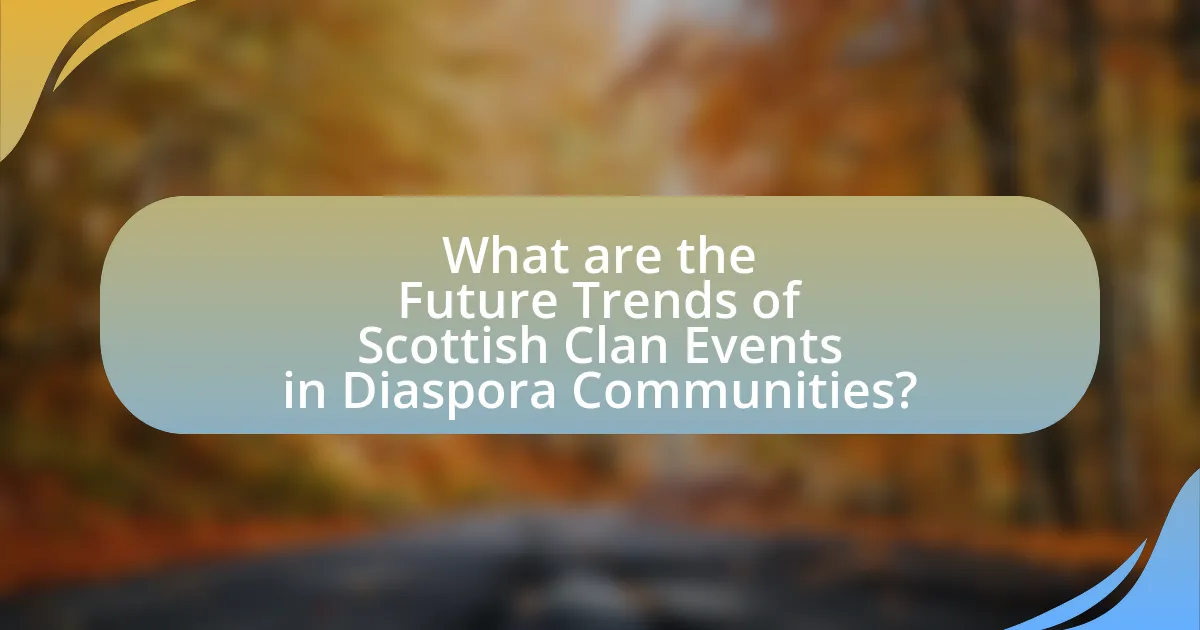
What are the Future Trends of Scottish Clan Events in Diaspora Communities?
Future trends of Scottish clan events in diaspora communities will increasingly focus on digital engagement and cultural preservation. As technology advances, virtual events and online platforms will facilitate participation from members worldwide, allowing clans to connect regardless of geographical barriers. This shift is evidenced by the rise of online gatherings during the COVID-19 pandemic, which demonstrated the potential for virtual clan meetings and celebrations to maintain community ties. Additionally, there will be a growing emphasis on inclusivity and diversity within these events, reflecting the multicultural nature of diaspora communities. This trend is supported by the increasing collaboration between Scottish clans and local cultural organizations, promoting a broader understanding of Scottish heritage while embracing the unique identities of diaspora members.
How is technology shaping the future of clan events?
Technology is significantly shaping the future of clan events by enhancing connectivity and engagement among members, regardless of geographical barriers. Digital platforms enable clans to organize virtual gatherings, share resources, and maintain cultural traditions through live-streamed events and social media interactions. For instance, during the COVID-19 pandemic, many Scottish clans successfully transitioned to online events, allowing participation from diaspora members worldwide, which increased attendance by up to 50% compared to traditional in-person gatherings. This shift not only preserves clan heritage but also fosters a sense of community among dispersed members, ensuring that cultural practices continue to thrive in a modern context.
What digital platforms are being used to connect diaspora members?
Digital platforms such as Facebook, WhatsApp, and Zoom are being used to connect diaspora members. These platforms facilitate communication and community building among individuals who share a common heritage, allowing them to participate in virtual events, share cultural content, and maintain relationships across distances. For instance, Facebook groups dedicated to specific clans enable members to share news and organize events, while WhatsApp allows for real-time communication among members. Zoom has become essential for hosting virtual clan gatherings and events, especially during times when in-person meetings are not feasible.
How can virtual events enhance participation from global communities?
Virtual events can enhance participation from global communities by removing geographical barriers and providing accessible platforms for engagement. This inclusivity allows individuals from diverse locations to join without the constraints of travel costs or time zones. For instance, a study by the International Journal of Event Management Research found that virtual events can increase attendance by up to 300% compared to in-person gatherings, demonstrating their effectiveness in reaching wider audiences. Additionally, features like live streaming, interactive Q&A sessions, and social media integration foster real-time interaction, further engaging participants from various backgrounds.
What role do younger generations play in the evolution of clan events?
Younger generations play a crucial role in the evolution of clan events by introducing modern perspectives and innovative practices that enhance participation and engagement. Their involvement often leads to the incorporation of technology, such as social media and online platforms, which facilitates broader outreach and connection among clan members globally. For instance, younger individuals frequently organize events that reflect contemporary interests, such as music festivals or cultural workshops, which attract diverse audiences and foster a sense of community. This shift not only revitalizes traditional clan gatherings but also ensures their relevance in a rapidly changing social landscape, thereby preserving cultural heritage while adapting to new societal norms.
How are youth engaging with traditional clan events?
Youth are engaging with traditional clan events through active participation in cultural activities, social media promotion, and community organization. Many young individuals attend clan gatherings, where they partake in traditional games, music, and storytelling, fostering a sense of identity and belonging. Additionally, social media platforms are utilized by youth to share experiences, connect with others, and promote upcoming events, thereby increasing attendance and interest. Research indicates that these engagements help strengthen cultural ties and enhance community cohesion among diaspora populations, as seen in studies conducted by the University of Edinburgh, which highlight the role of youth in revitalizing clan traditions.
What innovative ideas are emerging from younger clan members?
Younger clan members are introducing innovative ideas such as digital storytelling, sustainable tourism initiatives, and community engagement through social media platforms. These ideas aim to enhance cultural preservation and foster connections among diaspora communities. For instance, digital storytelling allows younger members to share clan histories and personal narratives online, making them accessible to a global audience. Sustainable tourism initiatives focus on promoting eco-friendly practices during clan gatherings, which not only attract visitors but also support local economies. Additionally, leveraging social media for community engagement helps younger clan members organize events, share resources, and maintain relationships across distances, thereby strengthening the clan’s global presence.
What practical tips can diaspora communities implement for successful clan events?
Diaspora communities can implement several practical tips for successful clan events, including effective planning, community engagement, and cultural representation. Effective planning involves setting clear objectives, establishing a budget, and creating a detailed timeline to ensure all aspects of the event are organized. Community engagement can be enhanced by involving local members in the planning process, which fosters a sense of ownership and encourages participation. Cultural representation is crucial; incorporating traditional music, dance, and food can create an authentic experience that resonates with attendees. These strategies have been shown to increase attendance and satisfaction at clan events, as evidenced by successful gatherings in various diaspora communities that prioritize these elements.
How can effective planning enhance the experience of clan events?
Effective planning can significantly enhance the experience of clan events by ensuring that activities are well-organized, engaging, and culturally relevant. When events are meticulously planned, participants are more likely to enjoy a seamless experience that fosters community bonding and cultural appreciation. For instance, a study by the University of Edinburgh highlights that well-structured clan gatherings lead to higher participant satisfaction and increased attendance, as attendees feel their cultural heritage is being celebrated in an organized manner. This structured approach allows for the inclusion of traditional activities, educational workshops, and social interactions that resonate with the diaspora, ultimately strengthening their connection to their Scottish roots.
What best practices should be followed for inclusive participation?
Best practices for inclusive participation include ensuring diverse representation, fostering open communication, and creating accessible environments. Diverse representation involves actively recruiting participants from various backgrounds, which enhances the richness of perspectives and experiences. Open communication can be achieved by encouraging dialogue and feedback, allowing all voices to be heard and valued. Creating accessible environments means removing physical, social, and technological barriers, ensuring that everyone can engage fully. Research indicates that inclusive practices lead to better decision-making and innovation, as diverse teams are more effective in problem-solving and creativity.
